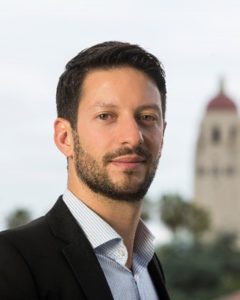 |
Matteo Cargnello received his Ph.D. in Nanotechnology in 2012 at the University of Trieste, Italy, under the supervision of Prof. Paolo Fornasiero. He was then a post-doctoral scholar in the Chemistry Department at the University of Pennsylvania with Prof. Christopher B. Murray before joining the Faculty at Stanford University in January 2015. He is currently Associate Professor of Chemical Engineering and, by courtesy, of Materials Science and Engineering and Vance D. and Arlene C. Coffman Faculty Scholar. Dr. Cargnello is the recipient of several awards including the Sloan Fellowship in 2018, the Mitsui Chemicals Catalysis Science Award for Creative Work in 2020, and the Early Career Award in Catalysis from the ACS Catalysis Division in 2022.
The general goals of the research in the Cargnello Group pertain to solving energy and environmental challenges. The group focuses on capture and conversion of carbon dioxide, emission control and reduction of methane and hydrocarbon emissions in the atmosphere, sustainable chemical practices through electro- and photocatalysis, sustainable production of hydrogen, and chemical recycling of plastics. Find out more about the Cargnello Group on their webpage |
Read Matteo’s Emerging Investigator article ‘Understanding the geometric and basicity effects of organic polymer modifiers on Ru/TiO2 catalysts for CO2 hydrogenation to hydrocarbons‘, DOI: 10.1039/D2CY01596J
1. How do you feel about Catalysis Science & Technology as a place to publish research on this topic?
Catalysis Science & Technology is a journal with the most exciting, deep fundamental and applied work in catalysis where it is possible to deeply learn about a catalytic process or phenomenon. I enjoyed publishing here our detailed work on fundamental structure-property relationships in hybrid catalysts, and I will continue to consider this journal as the prominent venue for careful and impactful catalysis work.
2. What aspect of your work are you most excited about at the moment and what do you find most challenging about your research?
I am excited about the many possibilities that these hybrid systems can offer in directing selectivity in catalytic processes. We only just started learning about their properties for CO2 hydrogenation, and there are many other reactions and materials systems that we want to investigate. The space is large, so are the possibilities.
3. In your opinion, what are the most important questions to be asked/answered in this field of research?
How to control selectivity in catalytic transformations by tuning and controlling secondary interactions beyond adsorption binding strength on a specific active site. In other words, active site control beyond binding site.
4. Can you share one piece of career-related advice or wisdom with other early career scientists?
Ask yourself the right questions, and spend most of your time refining the question rather than looking for the answer.










